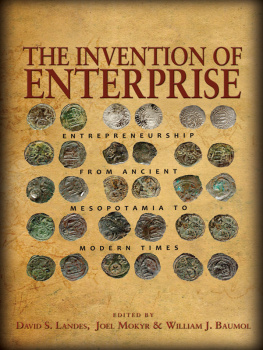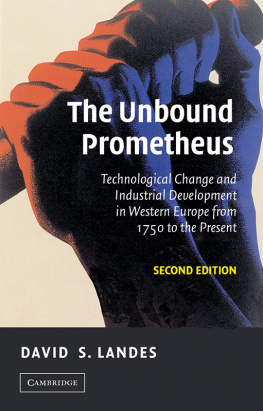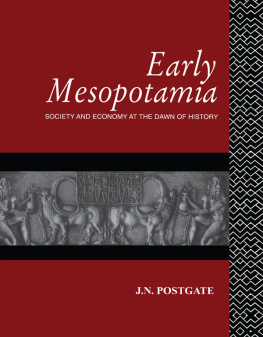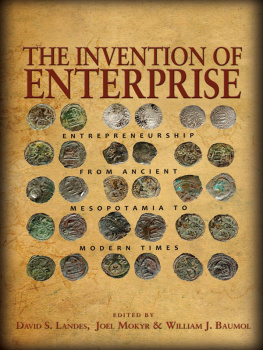Acknowledgments
THE IDEA FOR THIS BOOK arose in a conversation between Bob Strom and Will Baumol when the former accepted an invitation to teach a course in entrepreneurship. As we discussed material for the course and approaches that would place the topic in historical context, the idea for this book emerged.
As neither of us is a historian, the need for help was clear. We were determined to seek editors who were second to none, and our thoughts turned first to David Landes and Joel Mokyr. It seemed miraculous that both scholars accepted our invitation immediately. They thoughtfully assembled an outline for the volume, and Joel compiled a list of promising contributors. Once again, we were delighted to find that most of the authors quickly accepted the invitations and were enthusiastic about this project.
In order to ensure that the volume was not a mere collection of miscellaneous papers with little relation to each other, we, the editors, set out a list of topics that the authors would be asked to addresswith some degree of flexibility, of course. At an authors' conference at New York University in October 2006, drafts of the chapters were discussed both in terms of their substance and their coherence to this list of topics. With another year of revision and editing, we hope that what has emerged is indeed a volume that is illuminating, readable and cohesive.
Though it sometimes entailed hard work, the task has been a great pleasure, and the enhanced friendship with our two editors has been a rich reward. In addition to what is owed to their efforts, we must also recognize the invaluable contribution of Alyse Freilich, who read the manuscripts closely, edited them with care and understanding, and finally shepherded them to the publisher. She stepped in to rescue us after the very sad passing of Sue Anne Blackman, our beloved colleague of many years, who had been expected to oversee the preparation of this volume. She and Janeece Lewis, Baumol's very capable associate at NYU, deserve much of the credit for the final emergence of the volume.
We must also express our gratitude to our colleagues at Princeton University Press, with whom we have worked before, so that their helpful contribution came as no surprise. Finally, we must acknowledge our tremendous debt to the Ewing Marion Kauffman Foundation, not only for its very encouraging support of this volume, but perhaps even more for giving it one of the inaugural positions in the Kauffman Foundation Series on Innovation and Entrepreneurship.
WILLIAM J. BAUMOL AND ROBERT J. STROM
Chapter 1
Entrepreneurs: From the Near Eastern Takeoff to the Roman Collapse
MICHAEL HUDSON
A CENTURY AGO ECONOMISTS could only speculate on the origins of enterprise. It seemed logical to assume that entrepreneurial individuals must have played a key role in archaic trade, motivated by what Adam Smith described as an instinct to truck and barter. When a Mycenaean Greek site from 1200 BC was excavated and storerooms with accounting records found, the building accordingly was called a merchant's house, not a public administrative center.
There was little room for Max Weber's idea that a drive for social status might dominate economic motives. Materialist approaches to history both by Marxist and by business-oriented writers assumed that economic factors determined status and political power, not the other way around. The basic context for enterprise was deemed to consist of timeless constants: money, account-keeping to calculate gains, credit, and basic contractual formalities. To the extent that public institutions were recognized as economic actors, they were assumed to be an overhead, incurred at the expense of enterprise, not as means of promoting it. There was little idea of temples and palaces playing a catalytic role, much less a key one in production or providing money and provisioning commercial ventures. There was even less thought of rulers regulating markets, canceling personal debts, and reversing land transfers as a way to enhance prosperity.
Translation of cuneiform records over the past century has changed these attitudes. A veritable explosion of colloquia over the past decade has analyzed the emergence of enterprise in Mesopotamia and its neighbors (in particular Dercksen 1999; Bongenaar 2000; Zaccagnini 2003; Manning and Morris 2005; and, earlier, Archi 1984, in addition to the compendious Civilizations of the Ancient Near East [Sasson et al. 1995]). Our own working group, the International Scholars Conference on Ancient Near Eastern Economies, has held colloquia dealing with the public/private balance (Hudson and Levine 1996), the emergence of urban and rural land markets (Hudson and Levine 1999), debt practices and how societies handled the economic strains they caused (Hudson and Van De Mieroop 2002), account-keeping and the emergence of standardized prices and money (Hudson and Wunsch 2004). These conference volumes have been bolstered by many books and articles presenting a complex view of the emergence of commercial enterprise.
The vast supply of Near Eastern tablets and inscriptions dealing with economic affairs is being translated free of the past generation's ideological split over whether the economic organization of classical Greece was ancient, primitivist, and anthropological in character, as asserted by Karl Bcher, Karl Polanyi, and Moses Finley, or modern, as asserted by Eduard Meyer and Mikhail Rostovtzeff. (The basic documents in the century-old debate are collected in Finley 1979. For a recent discussion see Manning and Morris 2005.) Half a century ago, Polanyi and Finley criticized modernist views of antiquity by claiming that it operated as part of a system more traditional and bureaucratic than entrepreneurial. The quasi-Marxist theory of Oriental despotism was even more extreme. But the past few decades of scholarship have seen the pendulum swing back away from such views, finding many innovative economic practices in the ancient world (Hudson 20056).
It is now recognized that most of the techniques that would become basic commercial practices in classical antiquity were already developed in the third millennium BC in the temples and palaces of the Bronze Age Near Eastmoney, along with the uniform weights, measures, and prices needed for account-keeping and annual reports (Hudson and Wunsch 2004), the charging of interest (Van De Mieroop 2005; Hudson and Van De Mieroop 2002), and profit-sharing arrangements between public institutions and private merchants ranging from long-distance trade to leasing land, workshops, and retail beer-selling concessions (Renger 1984, 1994, 2002). Assyriologists now apply the term entrepreneur broadly to Assyrian and Babylonian tamkarum merchants from early in the second millennium BC down to the Egibi and Murashu families of Babylonia in the seventh through fifth centuries BC, who created novel commercial strategies to manage estates and provision the palace and its armed forces.
These practices initially were developed to create an export surplus of textiles, metalwork, and other labor-intensive products to obtain the stone, metal, and other raw materials lacking in southern Mesopotamia (what is now Iraq). During the second millennium these techniques diffused westward via Ugarit and Crete to Mycenaean Greece. After the long Dark Age that followed the collapse of Mycenae circa 1200 BC, seafaring merchants brought them to Greece and Italy, where they were adopted circa 750 BC in a context less conducive to enterprise and with fewer institutional checks and balances on debt, dependency, and economic polarization. Clientage came to be viewed as a natural state of affairs as economic attitudes changed from those in the Near East.
Wealthy Greek and Roman families controlled handicraft production, trade, and credit directly rather than coordinating these activities via the temples and palaces. Yet classical antiquity's aristocratic attitude viewed commercial enterprise as demeaning and corrupting. The details of trade and enterprise typically were left to outsiders or to slaves and other subordinates acting as on-the-spot managers, organizers, and middlemen for their backers. Most enterprising individuals were drawn from the bottom ranks of the social scale, typified by the fictional but paradigmatic freedman Trimalchio in Petronius's comedy dating from the time of Augustus. The greater a man's
Next page













